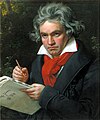Wikipedia:WikiProject Germany/Portal:North Rhine-Westphalia
|
NRW Portal
Portals → Geography → Europe → Germany → North Rhine-Westphalia → nrw.de
Selected1 panoramaIntroduction
 North Rhine-Westphalia (German: Nordrhein-Westfalen [ˈnɔɐ̯tʁaɪn vɛstˈfaːlən] , usually shortened to NRW, official short form NW) is the westernmost, most populous, and economically most powerful state of Germany. The state was formed in 1946, by merger of two rather distinct territories of the historic Free State of Prussia: the Rhine Province and the Province of Westphalia. The former Free State of Lippe was joined in 1947. North Rhine-Westphalia is situated "deep in the West" of Germany and includes the plains of the Lower Rhine region and parts of the Central Uplands (Mittelgebirge) up to the gorge of Porta Westfalica. The state comprises a land area of 34,083 km² (13,158 square miles) and shares borders with Belgium in the southwest and the Netherlands in the west and northwest. It has borders with the German states of Lower Saxony to the north and northeast, Rhineland-Palatinate to the south and Hesse to the southeast. North Rhine Westphalia has a population of approximately 18 million inhabitants, and is centred around the polycentric Rhine-Ruhr metropolitan region, which includes the formerly industrial Ruhr region and the Rhenish cities of Bonn, Cologne (Köln) and Düsseldorf. 30 of the 80 largest cities in Germany are located within North Rhine-Westphalia. The state's capital is Düsseldorf, the state's largest city is Cologne. As the most urbanised federal state in Germany, North Rhine-Westphalia possesses the country's highest density of cultural, educational and research institutions, the densest transport infrastructure and the highest number of multinational corporations. North Rhine-Westphalia contributes about 22% to Germany's gross domestic product and accounts for about 28% of the country's foreign direct investments.[1] TopicsSelected article
Kraftwerk (meaning "power plant" or "power station", German pronunciation: [ˈkʁaftvɛɐk]) is a pioneering and a highly influential electronic music band from Düsseldorf, Germany. The signature Kraftwerk sound combines driving, repetitive rhythms with catchy melodies, mainly following a Western classical style of harmony, with a minimalistic and strictly electronic instrumentation. The group's simplified lyrics are at times sung through a vocoder or generated by computer-speech software. Kraftwerk were one of the first groups to popularize electronic music. In the early to late 1970s and the early 1980s, Kraftwerk's distinctive sound was revolutionary, and it has had a lasting effect across many genres of modern music.
Selected biography
Ludwig van Beethoven (baptised 17 December 1770 – 26 March 1827) was a German composer and pianist. He was a crucial figure in the transitional period between the Classical and Romantic eras in Western classical music, and remains one of the most acclaimed and influential composers of all time.
Born in Bonn, of the Electorate of Cologne and a part of the Holy Roman Empire of the German Nation in present-day Germany, he moved to Vienna in his early twenties and settled there, studying with Joseph Haydn and quickly gaining a reputation as a virtuoso pianist. Related portalsSelected imageSubcategoriesAssociated WikimediaThe following Wikimedia Foundation sister projects provide more on this subject:
|
Berlin | Brandenburg | Hamburg | Mecklenburg-Vorpommern | North Rhine-Westphalia | Schleswig-Holstein
- ^ data by NRW.INVEST













